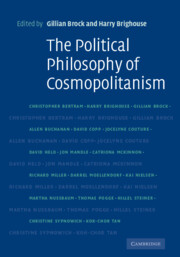Book contents
- Frontmatter
- Contents
- List of contributors
- Preface
- 1 Introduction
- 2 Principles of cosmopolitan order
- 3 Territorial justice and global redistribution
- 4 International justice and the basic needs principle
- 5 Cosmopolitans, cosmopolitanism, and human flourishing
- 6 Global justice, moral development, and democracy
- 7 A cosmopolitan perspective on the global economic order
- 8 In the national interest
- 9 Cosmopolitan respect and patriotic concern
- 10 Persons' interests, states' duties, and global governance
- 11 The demands of justice and national allegiances
- 12 Cosmopolitanism and the compatriot priority principle
- 13 Beyond the social contract: capabilities and global justice
- 14 Tolerating injustice
- 15 Cosmopolitan hope
- Bibliography
- Index
12 - Cosmopolitanism and the compatriot priority principle
Published online by Cambridge University Press: 04 December 2009
- Frontmatter
- Contents
- List of contributors
- Preface
- 1 Introduction
- 2 Principles of cosmopolitan order
- 3 Territorial justice and global redistribution
- 4 International justice and the basic needs principle
- 5 Cosmopolitans, cosmopolitanism, and human flourishing
- 6 Global justice, moral development, and democracy
- 7 A cosmopolitan perspective on the global economic order
- 8 In the national interest
- 9 Cosmopolitan respect and patriotic concern
- 10 Persons' interests, states' duties, and global governance
- 11 The demands of justice and national allegiances
- 12 Cosmopolitanism and the compatriot priority principle
- 13 Beyond the social contract: capabilities and global justice
- 14 Tolerating injustice
- 15 Cosmopolitan hope
- Bibliography
- Index
Summary
INTRODUCTION
To think about morality seriously is among other things to hope that it can plausibly be made to have some reasonable form of objectivity. What form it can take (if any), and still make sense, is a deeply contested matter (Mackie, 1977). In this essay, we shall argue (1) that an objective morality should take the form of intersubjectivity best captured by the method of general and wide reflective equilibrium; (2) that such a method itself yields a conception of morality that is both (a) universalistic and cosmopolitan and (b) particularistic and contextual. We will further argue that any reasonable morality must be both (a) and (b); (3) that moving on to the domain of normative politics, a justified political morality must be a cosmopolitan morality. Moreover (or so we shall argue), a cosmopolitan morality should, where a nation's sovereignty is threatened or not accepted, yield a liberal nationalism if it is to be a justified political stance. This raises the compatriot priority question and with it, the issue of the consistency of a liberal nationalist cosmopolitanism. We shall consider that in some detail.
Let us begin with a brief methodological note on what John Rawls calls wide and general reflective equilibrium. What reflective equilibrium seeks to do is to discover patterns of coherence among our considered judgements or, where coherence is not to be found, to forge them into such patterns of coherence in good constructivist fashion (Rawls, 1999b, pp. 303–58).
- Type
- Chapter
- Information
- The Political Philosophy of Cosmopolitanism , pp. 180 - 195Publisher: Cambridge University PressPrint publication year: 2005
- 3
- Cited by

